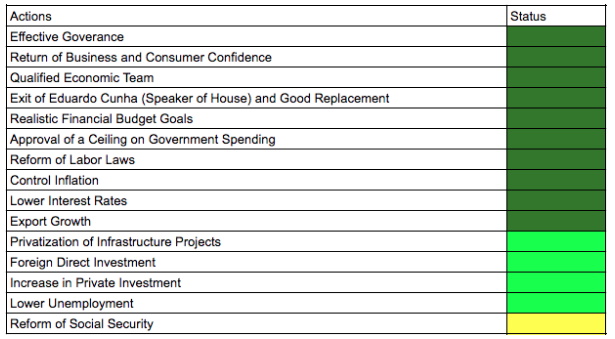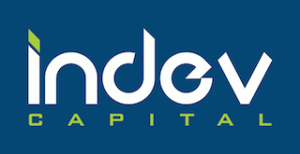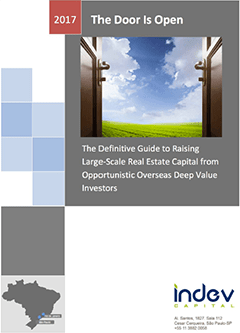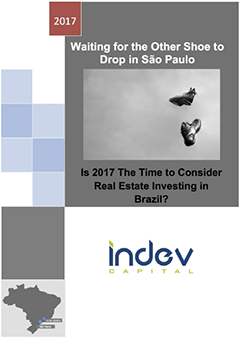
The higher you lift a pendulum in one direction, the more power the pendulum has to swing in the other direction. As an investor evaluates his or her global real estate investment opportunities, it may be valuable to determine where various markets reside on that swinging pendulum. One can make an argument that Brazil’s economy moved in a very negative direction in 2014 and has now started to rebound heading into 2018. For thoughtful investors, the pendulum may have just started its momentum in the other direction.
Purpose of This Newsletter

This newsletter’s objective is to provide a snapshot of Brazil’s economic shift. Is the recovery real and if so what proactive strategies can deep value real estate investors take advantage of in this specific moment in the real estate cycle? We will cover the recession and its depth (it was scary), the change in outlook, and the current economic momentum demonstrated in facts and figures. Importantly, we will provide information to understand the current status of the recovery. Finally, we will review how this economic change ties directly to specific real estate investment opportunities.
“The higher you lift a pendulum in one direction, the more power the pendulum has to swing in the other direction”
Quick Downturn Summary-When it Rains, it Pours
 Brazil’s recession was quite ugly. In Brazil, 2015 and 2016 were indeed truly awful years. The combined economic and political crisis was severe. The business community was paralyzed. It was the worst economic contraction in Brazil’s modern history, with GDP contraction of approximately 10 percent in three years, including a 3.6 percent contraction in 2016. Unemployment more than doubled from 2014 to the end of 2016, rising to 11.8 percent. Inflation increased sharply, reaching 10.67 percent in 2015, and interest rates nearly doubled to 14.25 percent in 2016. The downturn was led by the previous government’s decisions, which included over-subsidized credit, artificial inflation targets, and other market distortions. These misguided policies overstimulated consumption and investment, subsequently leading Brazil into recession; banks stopped lending, families reduced consumption, and businesses halted investments.
Brazil’s recession was quite ugly. In Brazil, 2015 and 2016 were indeed truly awful years. The combined economic and political crisis was severe. The business community was paralyzed. It was the worst economic contraction in Brazil’s modern history, with GDP contraction of approximately 10 percent in three years, including a 3.6 percent contraction in 2016. Unemployment more than doubled from 2014 to the end of 2016, rising to 11.8 percent. Inflation increased sharply, reaching 10.67 percent in 2015, and interest rates nearly doubled to 14.25 percent in 2016. The downturn was led by the previous government’s decisions, which included over-subsidized credit, artificial inflation targets, and other market distortions. These misguided policies overstimulated consumption and investment, subsequently leading Brazil into recession; banks stopped lending, families reduced consumption, and businesses halted investments.
It is difficult to overemphasize the sense of dread and malaise that hung over the economy during this period. Brazil is a fundamentally optimistic society, sometimes perhaps unwarrantedly so, yet there were many upper-class citizens who either did leave, tried to leave, or put serious thought into leaving Brazil via the EB-5 investment program and a similar program in Portugal. The large majority of what you heard in conversations was that all was bad.
Change in Outlook
 Today, one feels an entirely different energy in Brazil; storefronts that were closed have reopened, the animal spirits of capitalism have revived, and real estate REIT IPOs are occurring. Brazil’s economy has begun to turn the corner. The improvement currently seen in the economy has been made possible by the new political leadership, which has been steering economic policy in the right direction and restoring confidence that things will improve. While not completely abolished, political risk has lessened enough that the economy has started moving forward again.
Today, one feels an entirely different energy in Brazil; storefronts that were closed have reopened, the animal spirits of capitalism have revived, and real estate REIT IPOs are occurring. Brazil’s economy has begun to turn the corner. The improvement currently seen in the economy has been made possible by the new political leadership, which has been steering economic policy in the right direction and restoring confidence that things will improve. While not completely abolished, political risk has lessened enough that the economy has started moving forward again.
For many industries, the worst of the crisis has passed. The biggest increase can be seen in personal credit, which has increased 37% since October 2016. Consumer confidence is also up, increasing 26% over the past 15 months. However, due to the depth of the destruction to the country’s economy, the recovery will be slow and gradual. Just how deep is this hole the Brazilian economy is crawling out of? Property sales have fallen 46% since 2014 and are only expected to increase 25% by 2018. The production of capital goods decreased 39% between 2014 and 2016 and is expected to increase 14% by the end of 2018. Automobile sales have fallen 40% since 2013 and are expected to increase 37% by 2018. Even with the recoveries these markets are seeing, they will remain below pre-crisis levels. The improvements are all starting from a much lower base.
Signs of the recovery can be seen in companies such as Nissan which have started to grow their production and employment. Nissan’s factory in Resende, Rio de Janeiro, a R$2.6 billion investment, started operations in 2014 but, due to the market downturn, only recently reached 65% of its production capacity. This past July, the factory started operating a second shift, hiring an additional 600 workers, and allowing the factory to reach 80% production capacity. However, Nissan only expects its factory to reach its full production capacity of 200,000 cars/year in three years’ time.
Though both the current recovery and that of 2008 were driven by consumption, that is where the similarities end. Though modest, today’s growth is considered by most economists to be more sustainable. In contrast with 2008, today no artificial measures are being used to spur increased economic activity. The credit of public banks, which was boosted in the past, has fallen 2% in proportion to GDP since the end of 2015, though it remains at a higher level than that of private banks.
Source of Economic Data: “Brasil Começa a Consumar Virada Historica na Economia”, Exame Magazine, August 2017.
Not Ronald Reagan, but…
Michel Temer may be the least popular highly effective president in modern history. About a year ago, IstoÉ Magazine published a checklist, shown below. InDev Capital has updated this to show Temer’s progress to date.


Although these changes do not seem very significant, it is hard to overstate the impact they have had on the mindset of many Brazilian business people. In general, Brazil is a more emotive society than the US or most parts of Europe (with the likely exceptions of Italy, Spain, Portugal, and Greece). The emotion of many top-tier business executives has already shifted from passive to active.
After review of this chart and the results, is it somewhat more apparent why investors secretly love this man! Why secretly? Well, with a popularity rating of 5 percent, almost no one will say publicly that Temer has done an effective job at turning around a distressed situation. In addition, he has been charged with corruption twice by the former attorney general, so there is a cloud of suspicion around his ethics. Clearly, no airport in the nation’s capital will be named after Mr. Temer, but at least this author does give him and his economic team credit for turning around a very tough economic situation.
Joseph, Who Cares? How do I make Money on this trade?
Several months ago, I contributed to an article in IREI (Institutional Real Estate Investor) about how significant money can be made when things go from horrific to really bad. There is still money to be had during the transition from merely bad to stable / pretty good. In fact, there are several investment strategies that directly benefit from this rebound of Brazil’s economy while still providing the benefit of a low buy-in price.
Resi Restart Finance
Per our recent detailed white paper on this topic, the resi restart finance opportunity is a deep value trade. Why? Developers are motivated by the nascent recovery of the real estate market; however, due to the economic downturn of the last cycle, most developers do not have sufficient capital to restart their development projects. In addition, banks are much more stringent. This results in a deep discount buy-in on the land purchase and favorable economics on approved projects with solid core demand.
Loteamento – Lot Subdivision Business
Per our soon-to-be-released white paper on this topic, the lot development business has some quite unique opportunities. Due to the long approval period of five years, many projects that were started in 2012 are now approved and the city has grown to the vector of the land. However, as discussed, the downturn of 2014 to 2016 was quite severe and greatly affected many landowners of these subdivisions. This has created unique high-IRR buyout situations on approved land with clear demand and often sales in progress.
Niche Strategies
Along with the well documented strategies above, InDev Capital is very active in working on the investment thesis and potential high risk-adjusted return transactions in data center logistics, senior housing, shopping malls, and industrial real estate in this unique window in Brazil’s real estate cycle. Please feel free to reach out to me if these strategies are of interest.
Happy Investing and Glad to be Back in Touch!




